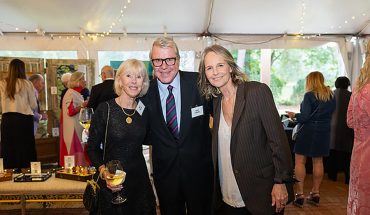by Todd Cohen
photographs by Jillian Clark
When she was a student in junior high school in Bradenton, Fla., Susan Reiland learned a powerful lesson about receiving and giving back. She and her brother and sister needed clothes and were referred to the thrift store operated by their church. “I was on the receiving end of their services to begin with,” she says. “Then I was able to volunteer there.”
Today, Reiland volunteers as distribution coordinator for Note in the Pocket, a Raleigh nonprofit that grew out of her charitable effort to collect clothing for school children who need it.
“I look around and see the many extraordinary challenges faced every day by those in need,” says Reiland, a former research assistant professor of statistics at N.C. State University and UNC-Chapel Hill who retired recently after a 30-year career in publishing with a focus on college math and statistics textbooks.
“I can’t fix everything, so I try to make a difference one person, one child at a time,” she says. “In the words of Mother Teresa, I cannot do great things, but I can do small things with great love.”
Note in the Pocket began in 2005, with a phone call from Reiland’s daughter, who was in her first year as a kindergarten teacher. The young woman was at a loss for what to do: Many children in her class at a low-income school lacked basic articles of clothing.
Reiland jumped into action and collected coats for the children. But half of the children returned the coats the next day; their parents could not believe anyone would give their children coats. So the coats were sent home again, this time with a note in the pocket saying they were a gift from the community and the children’s to keep.
Operating with an annual budget of less than $100,000 and a single paid employee, Note in the Pocket in 2014 delivered more than 47,000 articles of clothing valued at more than $324,000 to 2,276 individuals at 136 schools.
It partners with the Wake County Public School System and nonprofits that focus on homelessness and transitional housing. Social workers and case workers identify and refer students who may need clothes, listing their sizes and the items they need. Volunteers then assemble at least a week’s worth of clothes for each child, drawing on donations they’ve received. Then they label and deliver the packages.
“I am always inspired by the before-and-after stories from our social workers about the families who received clothing from Note in the Pocket,” Reiland says. “The stories of the excitement of the children to receive like-new clothing, and the joy of the parents, are heart-warming and provide steady reminders of why we do what we do.”
Reiland lives in Raleigh with her husband, Tom, an associate professor of statistics at N.C. State. They have six grown children who live in the Carolinas and Massachusetts.
Who were your parents?
Charles Freeman, my father, was a car salesman. He died when I was 10 years old, the oldest of three children. Bonnie Freeman, my mother, was a stay-at-home mom until my father died, then worked in the bindery at a printing company.
What did you learn from them?
Perseverance.
What did you want to be when you grew up?
A teacher.
What is your earliest memory of philanthropy?
From my mother, I learned that you don’t have to be rich to help others. She was a struggling widow with three young children, but she was always reaching out to help others. She wrote the book on selflessness.
Why does Note in the Pocket matter?
There are many far-reaching, negative effects of childhood poverty. By providing decent clothes and shoes, we strive to lessen the impact of these negative factors and provide each child a sense of pride and dignity. The clothes provided by Note in the Pocket allow children to arrive at school with a greater feeling of self-respect. The social stigma of lack of dress is reduced, and the children can more readily and comfortably access the educational tools needed to help change their circumstances. In short, something as simple as new clothes can provide a sense of dignity to these children and give them a chance at a better education.
What’s in the works at Note in the Pocket?
We are in the process of establishing advocacy teams in each of the 12 municipalities in Wake County. Their mission will be to raise awareness and generate volunteers, funding, and clothing donations. We will make presentations to civic and church groups, assist with set-up of clothing drives, get our name out there and get more volunteers and clothing donations. We have made an intentional decision not to undertake any new programmatic changes at this time, but rather to focus tightly on our mission to provide clothing assistance and to do that well.
What charities are nearest to your heart?
Note in the Pocket, of course, and food banks and pantries, free medical clinics and any organization that helps provide basic needs to the impoverished among us.
Who are your heroes?
Pope Francis and Mother Teresa, because of their concern for the poor and their core beliefs in the worth and dignity of every person, regardless of circumstance.
If you could fix a social problem, what would it be and how would you do it?
I would try to reduce poverty by creating jobs with living wages.
What does philanthropy mean to you?
Working to promote the common good for society as a whole.
What are you reading?
Same Kind of Different as Me, by Ron Hall and Denver Moore. It’s nonfiction about a wealthy couple in the Houston area. The wife started doing volunteer work in a homeless shelter, got her husband to participate, and became very close friends with one of the residents at the shelter. It’s the story of the evolution of that relationship.
Where do like to go for vacations?
Vacation? What’s that?
What is something people don’t know about you?
In high school, I played in a multiple-piano concert under Florida West Coast Symphony (now Sarasota Symphony) Director Paul Wolfe.
What is your philosophy of life?
Do your best in everything, every time, every place.
If you could have dinner with any three people who would they be?
My father because he died when I was young and I have precious few memories of him, and my sister and brother, who were younger and have even fewer memories of him.






